- Home
- Stephen R. Donaldson
The King's Justice: Two Novellas Page 5
The King's Justice: Two Novellas Read online
Page 5
“The King, if I have understood you, sir, would not disapprove of either of us.”
“He would not,” Black confesses. He has his own faith. The Balance Wars must not be permitted to resume. He has faith in his purpose. “Still there is evil to consider. There is Tamlin Marker’s murder to explain.”
Father Whorry remains angry. “And you expect that of us? An explanation?”
Black shrugs. “You have knowledge of the townsfolk that I do not. Perhaps that will suffice.
“You know what was done to Jon Marker’s boy?”
Father Tenderson nods with sadness in his eyes, but the Bright priest speaks first. “All Settle’s Crossways knows.”
“Do you also know how it chanced that Tamlin Marker was alone? That his killer was able to take him and remained unwitnessed?”
Now it is Father Tenderson who replies. “We have heard poor Jon’s account. Directly or by rumor, we have heard it. He sent the boy home to fire the stove.”
Black sits motionless as a stone. He reveals nothing. “And you do not call it unlikely that Tamlin’s killer was ready to take him at the moment when mere chance provided his opportunity?”
Both men are struck by the question. They have not considered the matter in that light. Father Whorry’s brows squirm. He rubs his hands together like a man attempting to wash away some stain. Father Tenderson stares with his eyes wide. He is too full of chagrin to contain it. When he speaks, his voice is hoarse.
“I call it unlikely now. Fool that I am, I did not think—” For a moment, he cannot continue. Then he asks, “How is such readiness possible? Do these shapers—?”
Black cuts him off. “No. Shapers are not seers. They do not foresee. If they did, some among them would see cause for restraint. The explanation I seek does not rely on sorcery.”
“Then how?” demands Father Whorry. “It is impossible. How was it done?”
Black cannot answer. The priests must help him. He changes his approach.
“Jon Marker,” he states, “lost his living in Ing Hardiston’s store after his wife’s passing.” He does not tell the priests how he knows this. “You, Father Whorry, went to his aid. You found employment for him with a wheelwright named Haul Varder.
“But Jon Marker is not a temple-goer. He does not belong to your flock. Indeed, he scorns both temples and priests. How does it chance that you alone in Settle’s Crossways sought to aid him?”
The Bright priest wants to shout a retort. He believes that now he is surely being accused. Yet he is out of his depth, and much of his anger is directed at himself. For that reason, he twists and cringes. How had he failed to grasp the unlikelihood of Tamlin Marker’s taking? He has spent too much time besotted with wine and women. Though Black does not compel or confuse him, Father Whorry cannot refuse to answer.
“The man needed help.” He is shamed by the smallness of his voice, or by his own smallness. “What else could I do? Bright Eternal does not discriminate. You say my god does not care. If that is true, it is also true that he does not judge. I offered Jon consolation, but he would not take it. Yet his need was severe. I did what I could.”
To Black, Father Tenderson murmurs softly, “His service is pure. There is only kindness in his heart.”
“And kindness in Haul Varder’s,” the Bright priest asserts more stoutly.
The taller man turns to his friend. Still softly, he urges, “Be honest, Father. Haul Varder is not known for kindness.”
The Dark priest makes Father Whorry squirm. He feels driven to bluster. “His childhood was one of misery. All Settle’s Crossways knows this. He did not learn kindness from his mother. Now his manner is dour and ungiving. What of it? He is known for self-interest, yes. He is much in demand, especially by caravans and wagoneers. But he could have readily found another to bend his iron and lathe his spokes. Settle’s Crossways does not lack young men who want work. It was kindness that chose Jon Marker.”
With the mildness of affection, Father Tenderson says, “More honest, Father.”
The small man surprises himself by blurting an oath. Then he recants. “Bright Eternal forgive me.” He speaks to his friend rather than to Black. “More honest? Well, if I must. For Tamlin Marker’s sake.
“Haul Varder is also known for absences. He is commonly absent. If he did not have a good man to tend his forge and his iron, his business would founder.
“But”—Father Whorry sees a gleam of hope that he can win free of his friend’s insistence—“he was present on the last day of Tamlin’s life. The boy worked with his father, sweeping floors and such. Jon Marker would not have sent his son home without Haul Varder’s leave. He is too courteous and diligent to be presumptuous with the man who pays his labor.”
An instant later, the Bright priest claps his hand to his mouth as though he has just heard himself utter an obscenity. In his heart, he is crying, Bright Eternal! God forgive me! Have I accused Haul Varder?
Father Tenderson spreads his hands. To Black, he says, grieving, “You see how matters stand. I do not regard the wheelwright as charitably as my friend does. He bargains meanly for his services. He treats men who cannot pay with disdain. He has neither wife nor child, and does not regret his lack—or does not acknowledge that he regrets it. His absences are many. Some are prolonged. All are unexplained.
“Yet I also must be honest. I know no ill of the man. Like Jon Marker, he is no temple-goer, but that is not a fault in him.”
There the Dark priest turns away. He gazes into the fire, searching the flames as he searches himself. “Father Whorry’s kindness serves as courage. I did not aid Jon Marker. I had not the heart to approach that harmed man. His losses filled my veins with weakness.
“I talk and talk. My good friend occasionally bridles at my profusion of talk. But when I open myself to my god and my flock, I obscure more than I reveal. The truth is that I am weak. My friend is the better man. He is the better priest.”
Black remains motionless. He considers what he has heard. He does not doubt either priest. They have given as much guidance as they possess, and it is more than they expect. Still he is baffled. He is both thoroughly shaped and well taught. His experience of sorcery, ambition, and greed is long by any measure. It has cost him pieces of his soul. Yet he knows of no ritual, even among those most vile, that requires lungs and livers. The King himself cannot draw upon air and heat.
Abruptly, Black stands. While his hosts scramble, surprised, to their feet, he says, “I have troubled you enough. A simpler question remains. Then I will disturb you no longer.”
Father Whorry only gapes. He is much distressed, though less by what he has said than by what he has been caused to think. Against his will, he wonders whether he is culpable for Jon Marker’s loss. He asks himself why he trusted Haul Varder’s apparent kindness. Father Tenderson would not have committed that cruel error.
For his part, however, the Dark priest recovers from painful concerns more swiftly. He is practiced at submerging his anger and woe, his many regrets. Black has given him cause for consternation, but it does not stifle his native curiosity.
“Answer one query, sir, and I will answer yours,” he replies with a semblance of his customary cheer. “You spoke of four elemental energies. Bright and Dark are two. What are the others?”
Black frowns. He finds that he does not wish to speak of such things. Naming them dismays him. It gives them a substance that he desires to deny.
Yet he is indebted to these men. Some debts he avoids when he can, as Bailey, the barkeep, will attest. Others he repays in full. And on its face, Father Tenderson’s inquiry is a small matter.
“They are air and heat,” he replies, “as necessary as bright and dark. But they cause no concern. No shaper calls upon them. They are too diffuse. The knowledge to concentrate them does not exist.”
He hopes that he speaks truth.
&n
bsp; “Accept my thanks, sir,” returns the Dark priest warmly. “I am edified. And your question?”
Black feels a need for haste that he cannot explain. “The caravan,” he says. It has come from the west. Perhaps it comes from lands unknown to him. “I must speak with its master, but I do not know the town. Where do such men spend the night?”
Father Tenderson laughs. “Or women, in this case,” he answers without hesitation. “Her name is Kelvera, though her men call her Blossom for obscure reasons. As for where she spends the night—” With a glance, he refers the question to his friend.
Lost in acid thoughts, Father Whorry names an inn without realizing that he is addressed or knowing that he answers.
Father Tenderson sees Black’s desire to depart. In a few words, he directs Black to the inn. Then he says with wry mirth, “You will not think me rude, sir, if I do not escort you to the door. I am concerned for my friend. He needs the solace of more wine. I recognize the signs.”
Black bows by inclining his head. Then he goes. Within himself he is running, though his stride is unhurried. He is sure of his ability to locate Haul Varder, but there are questions to which he desires answers before he approaches the wheelwright.
Among them is this. What use can a shaper make of lungs and livers? However, he does not expect to find an explanation in Settle’s Crossways, or from any caravaner. Instead he hopes to understand a more practical matter.
How had one shaper attracted enough followers to kill so many brigands and suffer no losses without some rumor of those followers finding its way to the priests, or attaching itself to Haul Varder?
If the wheelwright is innocent, the shaper and his followers must have come to this region from a considerable distance—and must have contrived to remain entirely secret for an unlikely number of days.
Black means to go directly to the inn Father Whorry named. As he skirts the edges of the crowded square, however, he encounters the mother and daughter who addressed him when he first entered Settle’s Crossways.
The mother’s name is Rose, and she was widowed by the same plague that claimed Annwin Marker. For that reason, her anxiety for her fey daughter, Arbor, is greater than it was. And it has grown still greater since her meeting with the stranger. Her good husband had the gift of calming her. He saw no harm in little Arbor’s real or imagined sight, and his unconcern eased Rose’s heart. Without him, she has been troubled daily by the fear that her daughter’s wits have strayed. But now she has a new fear. The stranger’s belief that Arbor’s sight is real is beyond her comprehension.
In Settle’s Crossways, a town remote from the larger world, and ignorant apart from the gossip of wagoneers and caravaners, the gift of unnatural sight is not preferable to an unbalanced mind.
But Arbor is not afraid. During the past day, she has spoken often of the stranger with the holes in his soul, and of her desire to help him. She has insisted that she can heal his holes, one or more of them. Seeing him again excites her. While Rose flinches in alarm, Arbor succeeds in pulling free of her mother’s hand. She runs toward the stranger as though she means to leap into his arms.
Black sees her. He sees her desire to touch him. But he also sees her mother’s fear. And he has his own reasons for caution. He knows what may become of the girl if she aids him while she is too young to understand what she does. He holds up one hand while the other secretly invokes a sigil of command.
Surprised by herself, the girl stops.
Rose hastens closer. “Arbor!” she cries in a voice that trembles too much to sound stern. “He is a stranger. Leave him alone.”
“But, Ma—” Arbor protests.
Still asserting his command, Black asks, “Your name is Arbor?” His tone is quiet reassurance.
The girl nods. She does not resist as her mother reclaims her hand.
Black meets the mother’s wide stare. “And your name, madam?”
His command reaches her. Unwillingly, she replies, “Rose.” But then she musters her resolve. “What have you to do with us, sir?” She aches for her husband’s presence at her side. He would speak more confidently. “You called my daughter precious. I do not understand you. She is precious only to me.”
Black nods. Soothing as water, he says, “Then hear me, Rose. Arbor has a gift for which I have no name. It is clear in her, though I cannot account for it. I am certain only that it is not ripe. When she is older, it will manifest more strongly, and more safely. For the present, it must not be spent on a stranger”—he gazes at Arbor ruefully—“even a stranger with holes in his soul.” Then he faces Rose again. “But you are precious also. You have your own gift. You call it fear or grief, but it has other names.
“There is a man who needs your gifts, both yours and Arbor’s. He is Jon Marker.” Seeing Rose’s bafflement, he adds, “You know of him. You know what he has lost. But perhaps you do not know that he is utterly alone.
“It would be a great kindness to befriend him.”
If Arbor feels an impulse to touch Jon Marker’s pain, she will do herself no harm.
Rose is confounded. Her stare becomes a frown. It becomes dismay. “You wish me to befriend a man I do not know? A man I have never met?”
Black still holds up his hand, though it no longer commands. “Father Tenderson will introduce you,” he says because he wants to hurry away. “Or Father Whorry.”
Then he touches his hat and withdraws into the crowd.
Rose follows the stranger with her eyes until she loses sight of him. She hardly feels Arbor tug at her hand. She hardly hears her daughter ask, “Can we, Ma? Can we meet him? The man who needs us?” The stranger has turned the mother’s world on its head, and she is no longer sure of her balance. She is nodding, but she does not know what she will do.
She does not know that Black has already put her from his mind. His thoughts run ahead of him rather than behind, traveling a road to a destination he cannot see, as he sifts through the throng until he clears the square. When he is able to gaze down the street, he scans it for the sign of the inn he seeks.
Soon he locates it. It is where the Dark priest told him it would be. At once, he ascends to the series of porches on that side and strides toward his goal. In his haste, he neglects to touch his hat to the townsfolk. They stare at him harder as he passes.
As he expects in a town of this size, the inn is also a tavern. Its swinging doors admit him to a room both larger and more elaborate than Bailey’s establishment. It has chandeliers for light and padded chairs at round tables for its patrons. Long mirrors behind the bar reflect the bustle of serving-maids and boys carrying a greater variety of viands than Bailey can offer. And in its own fashion, the place is as crowded as the square. Father Whorry has advised Black well. A profusion of wines, ales, and spirits flows as wagoneers, caravaners, and their guards demand refreshment after their long deprivation. Half or more of the men and women who have come with the caravan will resume their journey on the morrow with aching heads and complaining stomachs.
Amid the confusion, however, the shouts for service or companionship, the noise of camaraderie, and the clatter of eating, Black identifies the caravan-master without difficulty. She has the arms of a muleteer, the hands of a gravedigger, the hair of a wind-storm, and the bulk of a steer, but it is not by those signs that he knows her. He is sure of her because she sits at the only table that does not strain to accommodate too many patrons. Also her back is to the wall and her face to the door, she drinks sparingly, and the two men she permits to share her table defer to her as they eat.
As Black enters, the caravaners pay no heed, but every gaze that resides in Settle’s Crossways snaps to him as though he has come flinging daggers.
Like the inn itself, and its patrons, this does not surprise Black. He expects it, not because he is a stranger, but rather by reason of his actions against Ing Hardiston and the storekeeper’s comrades. He judge
s that Hardiston would not talk about his own defeat willingly, or permit his deeds to reflect discreditably on him. But the storekeeper needed a healer, as did one of his men. An explanation would be required. Therefore he will have told his version of events—a courageous, honorable version—to everyone he encounters. By now, half the town has heard Ing Hardiston’s tale.
This does not trouble Black. He has no use for the town’s good will. And he sees no indication that Hardiston’s tale has reached the caravan-master. She notices his arrival as she notices everything, but she betrays no reaction that will prevent him from speaking to her, or discourage her from answering.
Ignoring the townsfolk, he makes his way among the tables until he stands in front of Kelvera.
When she meets his gaze, he says her name with his accustomed silk. Without asking her permission, without removing his hat and cloak, he seats himself opposite her. She rests her forearms on the table. He does not. Her companions stare at him, openly astonished, but he does not regard them.
“Kelvera,” he says again. “Forgive my discourtesy. I must speak with you. The matter is urgent.”
He surprises her, though she gives no sign of her reaction. She is experienced and wily. In her many years of long journeys, guiding caravans through lands unknown to all but her and her captains, she has seen much, heard much, learned much. She knows a shaped man when she meets with one. They are rare in this kingdom, and have become more so since the ending of the old wars. Still she is certain that if this man exposes his arms, he will reveal an astonishing variety of glyphs, sigils, scarifications, and inlaid metals.

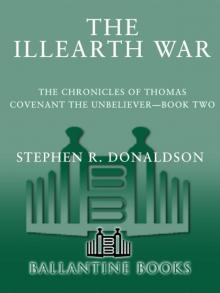 The Illearth War
The Illearth War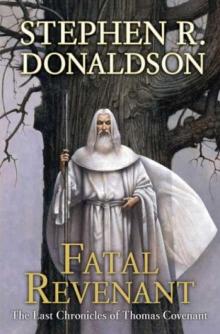 Last Chronicles of Thomas Covenant 02 - Fatal Revenant
Last Chronicles of Thomas Covenant 02 - Fatal Revenant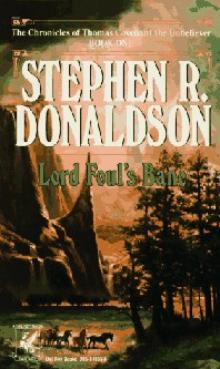 Lord Foul's Bane
Lord Foul's Bane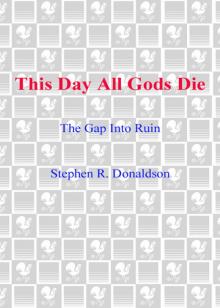 The Gap Into Ruin: This Day All Gods Die
The Gap Into Ruin: This Day All Gods Die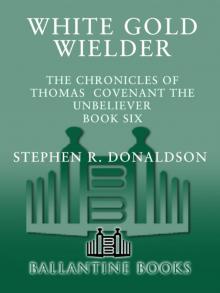 White Gold Wielder
White Gold Wielder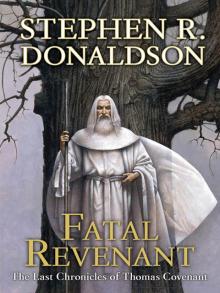 Fatal Revenant
Fatal Revenant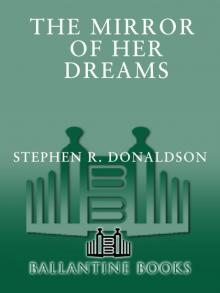 The Mirror of Her Dreams
The Mirror of Her Dreams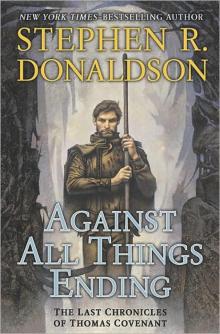 Against All Things Ending
Against All Things Ending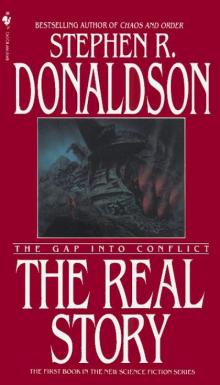 The Real Story: The Gap Into Conflict
The Real Story: The Gap Into Conflict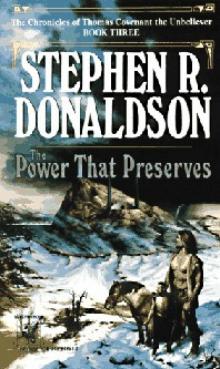 The Power That Preserves
The Power That Preserves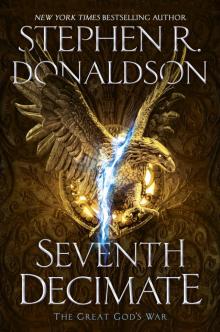 Seventh Decimate
Seventh Decimate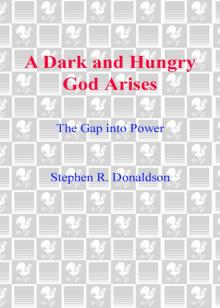 The Gap Into Power: A Dark and Hungry God Arises
The Gap Into Power: A Dark and Hungry God Arises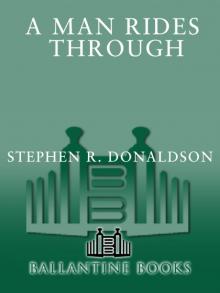 A Man Rides Through
A Man Rides Through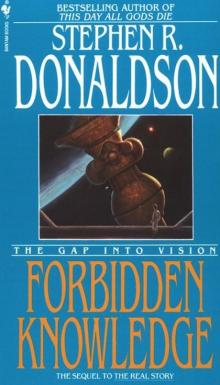 The Gap Into Vision: Forbidden Knowledge
The Gap Into Vision: Forbidden Knowledge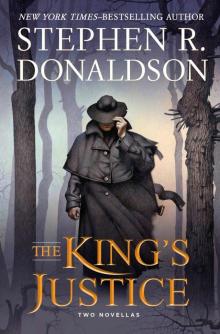 The King's Justice: Two Novellas
The King's Justice: Two Novellas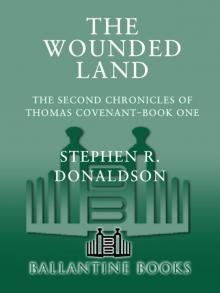 The Wounded Land
The Wounded Land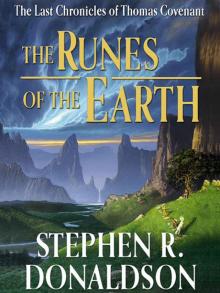 The Runes of the Earth
The Runes of the Earth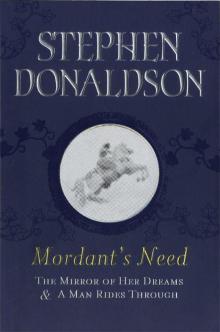 Mordant's Need
Mordant's Need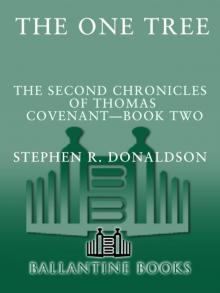 The One Tree
The One Tree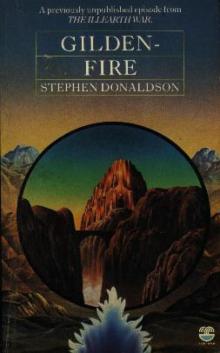 Gilden-Fire
Gilden-Fire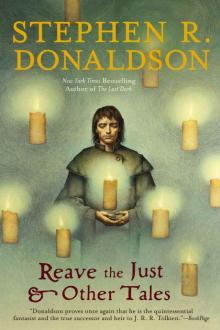 Reave the Just and Other Tales
Reave the Just and Other Tales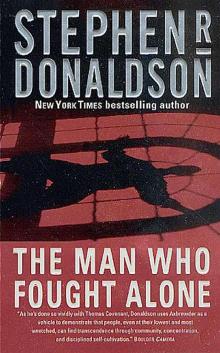 The Man Who Fought Alone
The Man Who Fought Alone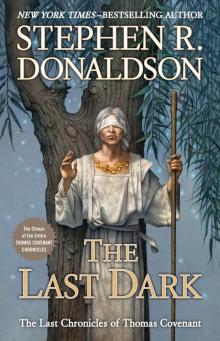 The Last Dark
The Last Dark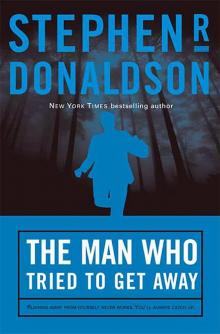 The Man Who Tried to Get Away
The Man Who Tried to Get Away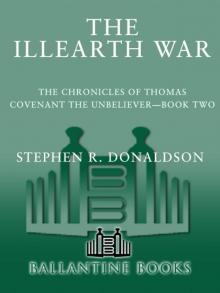 Thomas Covenant 02: The Illearth War
Thomas Covenant 02: The Illearth War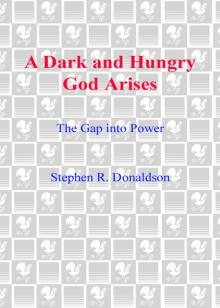 A Dark and Hungry God Arises
A Dark and Hungry God Arises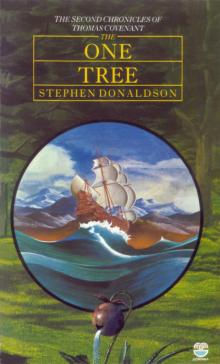 The One Tree t2cotc-2
The One Tree t2cotc-2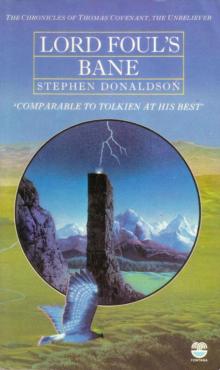 Lord Foul's Bane cotc-1
Lord Foul's Bane cotc-1 The Illearth War t1cotc-2
The Illearth War t1cotc-2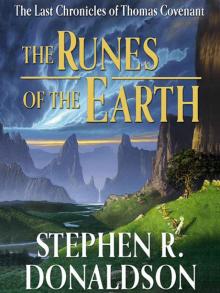 The Runes of the Earth: The Last Chronicles of Thomas Covenant - Book One
The Runes of the Earth: The Last Chronicles of Thomas Covenant - Book One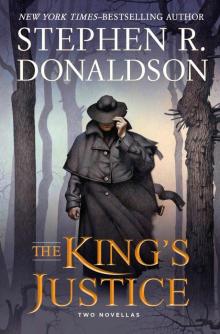 The King's Justice
The King's Justice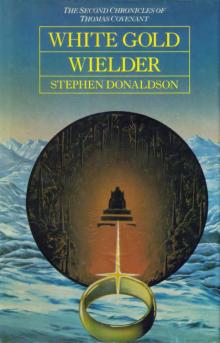 White Gold Wielder t2cotc-3
White Gold Wielder t2cotc-3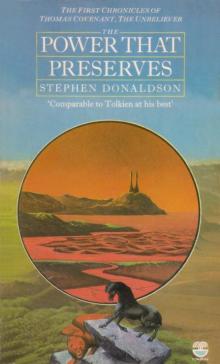 The Power That Preserves t1cotc-3
The Power That Preserves t1cotc-3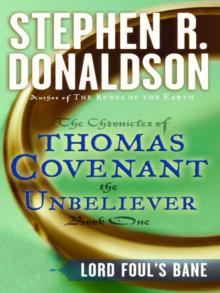 Thomas Covenant 01: Lord Foul's Bane
Thomas Covenant 01: Lord Foul's Bane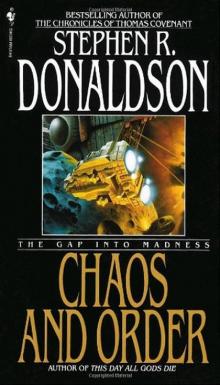 Chaos and Order: The Gap Into Madness
Chaos and Order: The Gap Into Madness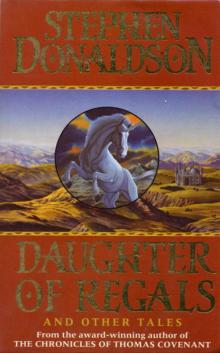 Daughter of Regals
Daughter of Regals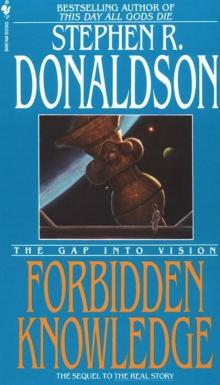 Forbidden Knowledge: The Gap Into Vision
Forbidden Knowledge: The Gap Into Vision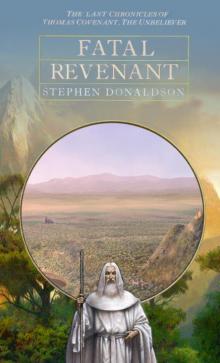 Fatal Revenant t3cotc-2
Fatal Revenant t3cotc-2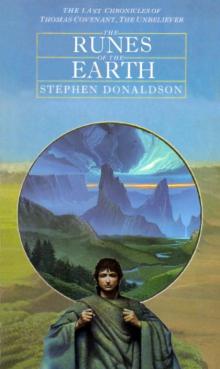 The Runes of the Earth t3cotc-1
The Runes of the Earth t3cotc-1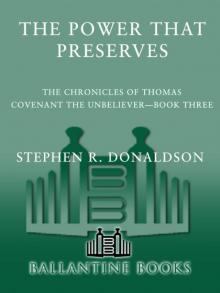 Thomas Covenant 03: Power That Preserves
Thomas Covenant 03: Power That Preserves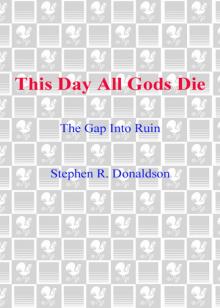 This Day all Gods Die: The Gap into Ruin
This Day all Gods Die: The Gap into Ruin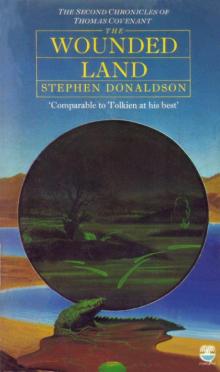 The Wounded Land t2cotc-1
The Wounded Land t2cotc-1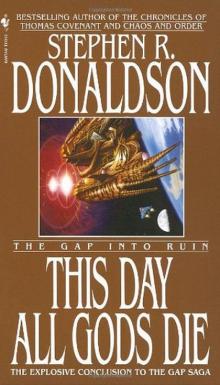 This Day All Gods Die
This Day All Gods Die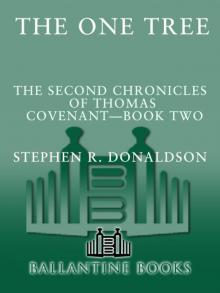 One Tree
One Tree